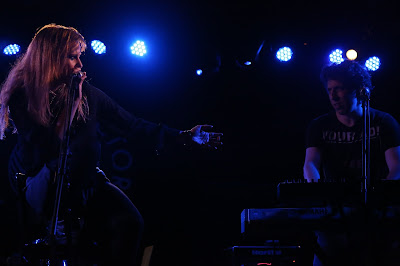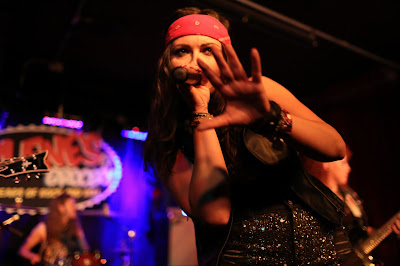 |
| Yula Beeri and Yuval Semo |
As soon as I walk into the performance space at the Knitting Factory on Monday evening, I sense that this show is somehow different. Maybe it’s the familial energy of the crowd, the sheer volume of people, or the fact that folks are actually dancing. Shahar Mintz closes his set and the musicians of Seasonal Beast begin bringing their gear onstage. They tune their guitars and violins, put up their keyboards and test their microphones. The lights go quiet blue and drown the audience in somber luminescence. An astral chord fills the space and plunges the psyche into a wormhole. The swallowing sound builds to a Floydian aesthetic and the pitch climbs like a fever until the first chilling words leave Yula Beeri’s mouth: “I can make you disappear.” Each instrument rings multidimensional, creating a singularity of sound with infinite refractions. Their collective sincerity is a window through which the audience can see the passion at the center and is left with no choice but to engage with their creation. Beeri takes us to the darkness with a high pitched wail that contains multitudes of depth. And once we’re locked in their world, the sound shrinks to a music box. “No One” starts with a carnival waltz beat that supports a rotating Ferris wheel keyboard progression and swooning trapeze vocals. A lullaby guitar slides in at the bridge, sweeping the song to another plateau of intensity as the single lyric repeats, a mantra bringing us further into their vision. “Playing in the Dark” highlights a violin that sounds like a dance with the Reaper until it transforms into sexually charged anger. “Another Day” opens with a military style drum and laser sound effects that build and build until- BOOM! A wall-of-noise guitar tears your skull apart. Hands tangled in her mane, Beeri becomes the wilderness mid-shriek and carries her voice to the sky. The whole affair is a hurricane of psychedelic rock that injects itself into your blood. Bandleader, songwriter, and keyboardist Yuval Semo takes over on vocals for “Heading to a Wall,” his stony, jagged voice heavy with truth. The three part harmony between himself, Beeri, and backup vocalist and keyboardist, Chen Prat, is almost alien in tone, a strange and fascinating effect. Languid, sweetened riffs float from the guitar, drifting atop featherlight drumbeats. The song gets thicker, more winding and layered as it goes on, unraveling at the end like a tapestry. “Ungovernable” is a new number that soars and takes you to its dreamcloud heights. Accented with a digital confetti keyboard movement that tickles the senses, it feels like an ode to freedom.
 |
| Chen Prat and Yula Beeri |
Noa Lembersky takes over the microphone for “Acapulco,” a funky dance tune that gets everyone moving like it’s 1999 when people still danced at shows. Her gritty blues tone shakes the air and a sea of lights on the ceiling make the disco balls glitter even brighter. How could anyone stand still? For the set closer, “Dry Bones,” Beeri sits on the edge of the stage, an intimate and deliberate theatrical decision. Drizzling piano gives way to sorrowful strings: a rainy portrait of rejection dipped in the watercolor pastels of Polaroid memory. The sensitively played piano gives the song a rich remorse, and and Beeri’s haunting voice strips my own heart bare.
These guys are good. Really good.
Yuval Semo and Yula Beeri met with me for interviews the following Thursday so we could talk about how they create such awesome music.
 |
| Yuval Semo |
Yuval Semo was born and raised in Israel and only had piano lessons from ages six to ten, being self-taught from there. He remembers listening to the Beatles as a child, and he tells me about finding his father’s treasure trove of classic rock records, although he can’t recall his parents ever listening to much music. Semo originally wanted to compose scores for films and he came to the United States to attend Berklee College of Music in Boston, eventually landing in New York City after graduating. About two and a half years ago, an issue with his visa left him unable to work for a few months, so he finally had time to throw himself into his own compositions. Already friends with Yula Beeri, he asked if she would want to perform some songs they had already recorded. He drafted some other musicians and they booked a show. The Beast was born.
“The most important thing is the connection with Yula,” he says, when asked about the band’s origins. “The problem is that I don’t sing…it’s a very limiting effect. It slowed me down for many years…To write a song that you care about, and then to have someone else sing it, not everybody can do it…My dream is to have someone’s voice as an instrument, that I can control perfectly. But it’s impossible. With Yula, she is the only person…[who] just understands exactly what I want and how I like it and what I’m hearing, and she hears something similar, and she’s able to adapt herself to me…I’m already thinking about her when I write songs. We have an understanding by this time. When we started to make music together, usually I was doing ten takes, or eighteen. With her, two takes and we got it. It was so immediate…It’s like she’s my alter-ego. She can speak my words and my music.”
 |
| Chen Prat |
I ask Semo what inspires him to make music. He laughs a little and replies, “Unfortunately, I’m not a very prolific writer. I wish I could wake up and write songs all the time…I think that ever since we started playing live, the musicians that I’m playing with have inspired me because I’m thinking about their abilities and what they can do, and what they like to do and what they tend to do. So I think my writing has changed a little bit since we started. About half the set you saw were songs I wrote after we started playing live. I think my mind is already writing for them…I’m inspired by music a lot, but not necessarily music that I like or love, or know very well…I get ideas from things I hear, sounds…it’s very random…Sometimes I think, what were the circumstances that led me to write this song two years ago? I want to recreate those circumstances, but it’s impossible… Most of the time [inspiration] doesn’t come until I’m nowhere near my piano.”
So how does he go about writing these incredible songs? “I try to craft the song just with the piano, or the guitar sometimes, just to write with an instrument that is not [my] primary instrument, then I will record it… some kind of guide, me playing and singing. Then I experiment with it, and I work on the song for sometimes weeks, months. Whenever I have time, whenever I want to get back to it. So basically I do everything myself, then typically I will get to the point where I cannot listen to my own voice anymore. The lyrics usually come at the end. Usually I just blubber some gibberish or come up with improvised words. Then I start to work with it, and those words start to make sense to me after a while. It’s kind of like my subconscious is talking.”
The spectacle aspect of a live show is also very important to the band. They try to get a lighting designer on board whenever possible. “It’s a show, not a listening party,” he says, “It has to be visually stimulating.”
Vocalist Yula Beeri is also Israeli, and is completely self-taught. She describes herself as having been “musical all her life.” Born to a theatrical family, her father was a director and her mother was an actress. When asked what she listened to growing up, she smiles. “Klaus Nomi, a lot. Kate Bush, a lot. Sting, The Police, a lot. Rachmaninoff, a lot. So, [I’m] definitely not very well-versed in popular culture. So all the odd, odd, odder things. The weirder stuff is what I tend to attract.”
Desiring change, she left Israel for New York about ten years ago and has found herself involved in all sorts of musical projects here. “I was a very shy person. I found this hilarious, fantastic group of people called the World Inferno Friendship Society, and I joined that band [as] a bass player, and I toured with them all over the place and wrote music for them until I found some musicians to start working [with] on other interesting, fun things, such as [Yula and] the Extended Family, which is sort of my music with all these people I’ve met over the years, and Kiss Slash Crooked Smile, which is another project, and Hydra, which is a vocal trio, like Bulgarian and a cappella music. And our latest folly is Rags Etc., which is a fashion show incorporating everything together…clothing, music, theatrics, a lot of fun.”
Beeri gives me a tour of The Hive, which is the performance space run by her nonprofit organization, The Hive NYC, where Seasonal Beast and other local bands as well as small theatre troupes and local designers can show their work. The Extended Family desperately wanted a space of their own to safely experiment and host artistic projects of all kinds. A refurbished garage transformed into a black box style venue that can easily shift from theater to concert hall to catwalk with a few moves of the flats and platforms, it is endowed with the good, accepting energy of any theatre classroom. Here, you are free to create.
I ask her what inspires her vocal performance. “Connectivity,” she says instantly. “Just being connected. If I am able to be connected, in that place and be relaxed and comfortable, that’s the biggest inspiration, I think.” And what does she feel when she connects with Yuval Semo onstage? “Drama. It’s theatre. I think there are so many great bands and musicians, and we’re lucky enough to live in a time where everything is bubbling so much. But I often lack that something that makes something very unique, and I think that’s those connections. Those moments that just grab you. And it’s drama. It’s not just music. It’s something that happens now.”
I’m hoping to see this band again when they play Mercury Lounge on June 7th, and I’m excited about the new live video they’ll be dropping in a few days as well as the EP to be released in the fall. Watch the video that got me hooked on their music below and get your ass to Mercury Lounge for the next show!
All photos by Dana Melaver

















